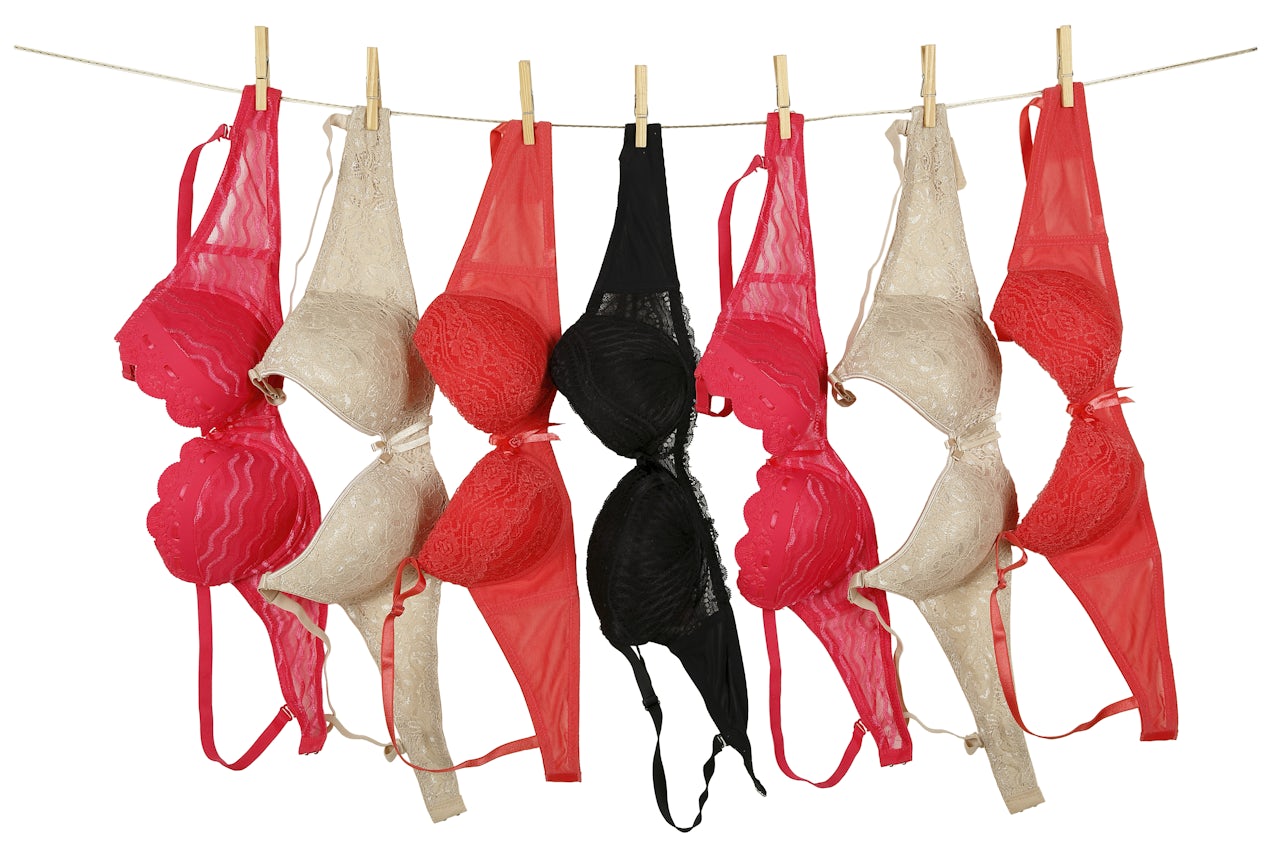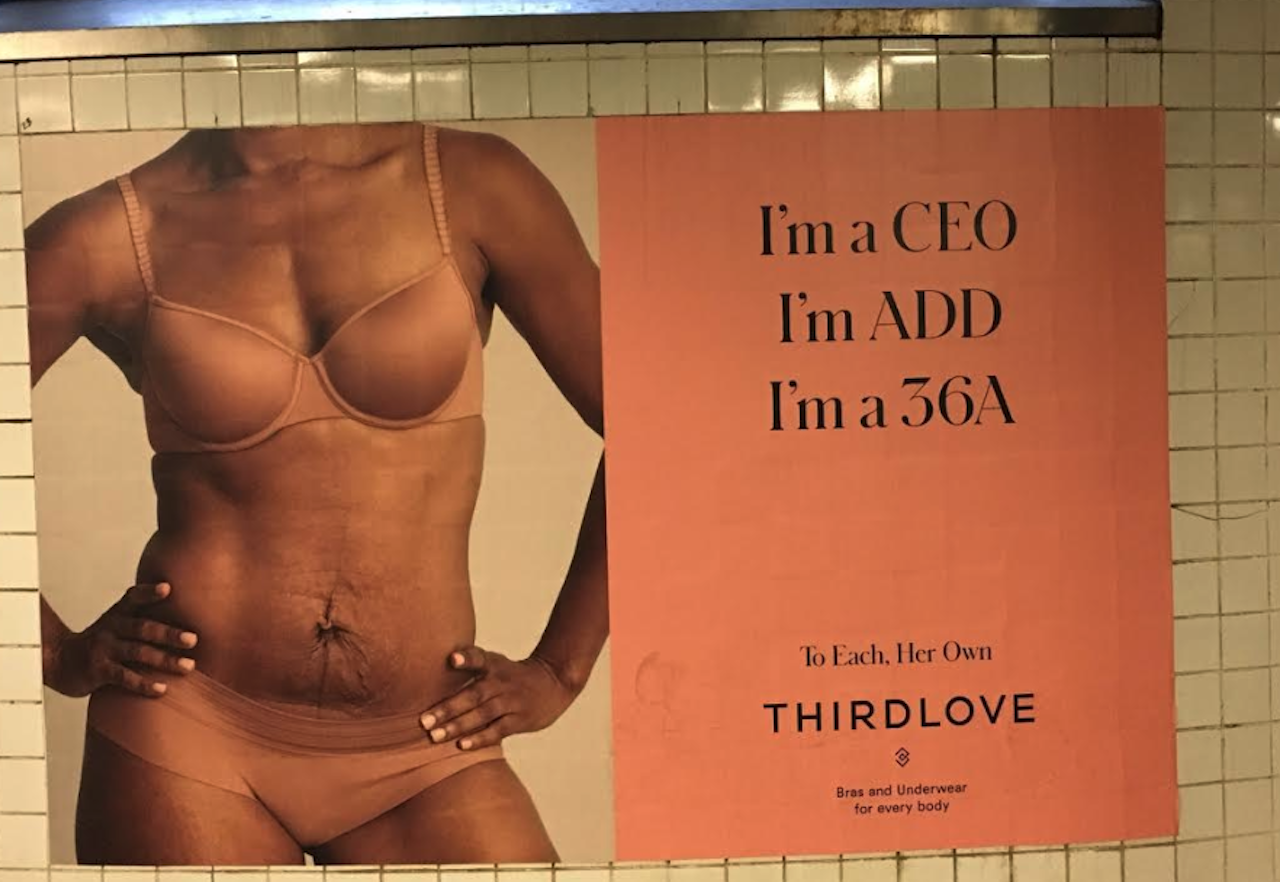My ADHD has nothing to do with my breasts. But for some reason, lingerie retailer ThirdLove thinks it does, plastering ads in New York’s subway system that read “I'm a CEO/I'm ADD/I'm a 36A” beside a woman in one of their bras.
The ad’s part of a larger marketing campaign that San Francisco-based ThirdLove, founded in 2013, announced in September. According to company statements, the campaign, which was designed by ad agency Partners & Spade, was meant to “celebrate the beauty of womanhood through personal and intimate moments that haven’t been shown before” while promoting the company’s bras, which run from $48 to $68. Personally, as a woman with attention deficit/hyperactivity disorder, when I think of intimate moments involving a brassiere, an underproduction of neurotransmitters — ADHD’s medical cause — does not come to mind.
ThirdLove’s communications manager, Megan Hernbroth, initially said there was no specific reason for the company to call out ADHD in its ads. But in a fact-check before this article’s publication, she changed her story, saying that the text in the ad “was a customer submission” sent over either Instagram or email: “The entire campaign was based on customer feedback, including how they would describe themselves.”
“We want to show that there is a real story and a real human being behind each bra with this campaign,” Hernbroth wrote to me in an email, “and we felt having ADD is something many women can relate to.”
In other words, ThirdLove perhaps hopes I — a woman with attention deficit disorder (and breasts!) — will see this ad and think, finally, a bra company that understands how hard it is to focus.
And it is hard. While living with ADHD has its pros, leading to a zany and eclectic life, it’s also exceptionally stressful. A “normal” brain uses neurotransmitters dopamine and norepinephrine to regulate attention, screening out unneeded stimuli. But the ADHD mind doesn’t make enough of either. As a result, our brains are over-flooded with information every day. Women with attention deficit are more likely to suffer anxiety or depression, have low self-esteem, or be bulimic. ADHD adults divorce at a rate nearly twice that of non-ADHD couples, and we’re 60 percent more likely to get fired. On average, we make $2 less an hour and are far more likely to live in poverty. In fact, 37 percent of women with the disorder earn so little, a University of Toronto report said we can’t even afford “basic expenses such as food, shelter, and clothing.”
Ironically, adults with ADHD spend up to $35 billion more a year than those without, largely on prescription medicines to make that much-needed dopamine. The Centers for Disease Control and Prevention reports that as more and more women are being diagnosed, we’ve become a hot market. Nearly five out of every 100 women have ADHD and from 2003 to 2015, the number of those between the ages of 15 and 44 seeking treatment grew by 344 percent. For ages 25 to 29, that increase was 700 percent. So out have come the fidget spinners, the calming therapy putty, the weighted specialty blankets, and other various crap.
But until now, at least the bra people had left us alone.
“This reference is another way that we are trying to capture the whole woman in our campaign, not just specific parts,” Hernbroth wrote. “Our goal was to capture the whole women of our campaign instead of just the physical attributes.” ThirdLove said that no other ads from this campaign featured disabilities; one showed a woman in the kitchen with her toddler, wearing nothing but a bra, a YouTube commercial featured a 71-year-old model in her brassiere, chilling in the living room with two other well-supported women.
As to why the subway ad read “I’m ADD” instead of “I’m ADHD” — the correct abbreviation for attention-deficit — Hernbroth said the customer wrote “ADD” and that ThirdLove “did not want to alter or edit how that woman had defined herself.” When asked if it would have been more responsible to have made sure ThirdLove got the acronym correct before putting it in an ad, Hernbroth wrote, “I think you are overgeneralizing my responses.”
I felt a little generalized myself when I saw a condition I’ve struggled with my whole life on a bra ad. The ad was meant, I suppose, as Hernbroth alluded, to make me feel whole. But instead of doing that, it just reminded me that no matter how hard I work or how much I try to pretend my mind is “normal,” it never will be. It’s there, in bold black letters on a subway ad: “I’m ADD.” But, for the record, these breasts are a 34DD.

